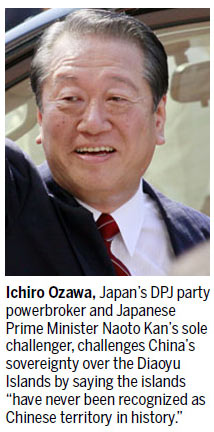Foreign and Military Affairs
Ozawa questions sovereignty of Chinese islands
By Ai Yang (China Daily)
Updated: 2010-09-06 07:59
 |
Large Medium Small |

Beijing - A number of Chinese analysts have dismissed statements by a high-level Japanese politician questioning the sovereignty of China's Diaoyu Islands as election campaign posturing.
On Sunday, just ahead of the Sept 14 leadership elections for the incumbent Democratic Party of Japan (DPJ), Ichiro Ozawa, the sole challenger of Japanese Prime Minister Naoto Kan, asserted that the islands "have never been recognized as Chinese territory in history."
Ozawa, who is also a key DPJ power broker, made his comments during a television debate with Kan aired by public broadcaster NHK. "There are various concerns over China, but it is important to speak to each other plainly," he was quoted as saying.
Chinese Foreign Ministry officials, noting the dispute between Beijing and Tokyo, have long maintained that the sovereignty of the Diaoyu Islands and adjacent islets - which lie between Okinawa and Taiwan in the East China Sea and have been Chinese territories since ancient times - has never been in question.
Foreign Ministry officials were unavailable for comment late on Sunday.
"The Diaoyu Islands belong to China and that fact is also supported by international law," said Gao Hong, an expert on Japanese studies with the Chinese Academy of Social Sciences.
The Sept 14 election will not only decide the leader of the ruling DPJ, but will also determine Tokyo's next prime minister.
The DPJ took power a year ago, after a sweeping upset of the country's Liberal Democratic Party (LDP), which had been dominant for decades.
| ||||
Feng Zhaokui, the former deputy head of the Institute of Japan Studies at the Chinese Academy of Social Sciences, said that Ozawa is playing the nationalism card to curry favor among the public - a tactic that is no stranger to Japanese politics.
Indeed, "Sino-Japanese relations are a hot topic in Japan," he said.
Japan's English-language newspaper, Mainichi, ran an analysis over the weekend noting that Kan and Ozawa's foreign policies differ - although both regard US-Japan relations as the most important, Kan is thought by experts to want to build a more cozy relationship with the country.
And while Ozawa has often cited both South Korea and China as Tokyo's "second" most important allies, Kan instead says he aims to "deepen Japan-US relations", the paper said.
While stressing stronger economic ties with China, Kan, too, has cast a negative light on China during the televised debate.
"We need to carefully watch China's growing military strength (and) if necessary we have to let them know of our concerns," he was quoted as saying.
"Kan and Ozawa stand on similar grounds regarding issues over China", Gao said. "There will be more engagement, but on the other hand wariness exists too."
Media reports also characterized the overall election race as "neck in neck", with "neither of the candidate substantially ahead of the other."
Zhou Wa and He Wei contributed to this story.











